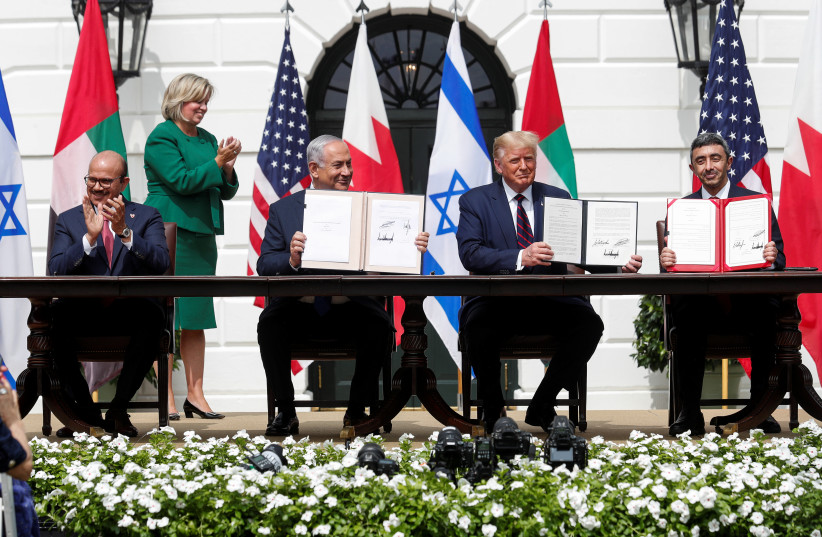
In the first quarter of 2022, trade volume between the UAE and Israel exceeded $1 billion.
Trade between the United Arab Emirates and Israel has exceeded $2.5 billion since the Abraham Accords were signed, the UAE’s Minister of State for Foreign Trade Dr. Thani bin Ahmed Al Zeyoudi, announced at the World Economic Forum in Davos on Wednesday.
The minister made the comments during a panel titled “The Future of the Abraham Accords,” alongside former Bahraini foreign minister Khalid bin Ahmed Al Khalifa, Chief Product Officer at Check Point Software Technologies Dorit Dor and American diplomat Stuart E. Eizenstat.
“In the last two years, the trade volume between the UAE and Israel exceeded $2.45 billion just in two years. Only in the first quarter of 2022, we already exceeded $1 billion, which means this year we’re going to exceed $2 billion,” said Al Zeyoudi.
The Emirati minister pointed to the slew of agreements and Memorandums of Understanding that have been signed between the two countries in recent years, saying that over 65 agreements have been signed so far.
“We already have some of the offices for our main sovereign wealth companies based in Israel and many of the Israeli companies are opening their licenses within the UAE,” said Al Zeyoudi, with over 1,000 Israeli businesses expected to base themselves in the UAE this year.

Israel and the UAE are also preparing to sign a free-trade agreement, with Al Zeyoudi stating that the agreement’s estimated impact on the Emirati economy will be about 0.4%, about $2 billion. The minister stressed that this was a conservative estimate and that the two countries expect to reach a trade volume of $5 billion in the next few years.
Bahraini-Israeli contacts began ‘way before’ Abraham Accords
Additionally during the panel, Al Khalifa stressed that his country’s efforts to open up to Israel and other countries in the region did not start in 2020. “It started way before that. We have always maintained frequent meetings [with] Israeli officials, including myself with Tzipi Livni and with others.”
The former Bahraini foreign minister stressed that the two countries broke the communication barrier during the Peace to Prosperity conference. “We talked to Israeli media, directly, straight into their homes with their morning programs and evening programs. We wanted to show them that peace is there in the Arab world.”
Al Khalifa also referenced the Palestinian-Israeli conflict, saying that Bahrain signed the Accords “without prejudice to our position regarding the Palestinian people.”
Arab Peace Initiative ‘de facto acceptance’ of Israel
“If you look at [the Arab Peace Initiative] closely, it’s de facto acceptance by every Arab country of the State of Israel in the region. We were approaching Israel as a country in the region to make peace with. We did not give this offer to the US, who has always been a helpful interlocutor, we gave it directly, publicly to Israel,” said the former foreign minister.
From the Israeli perspective, Dor pointed out that much of the peace reached between the Abraham Accords country was from the bottom up, from people who wanted to make economic relations successful.
Dor pointed to the fact that the countries involved have a lot of similar issues, including water scarcity, agriculture and food issues, cyber challenges and energy solutions. The CPO also pointed out that the Accords allow Israeli companies access to a much larger testing bed for products as beforehand they only had access to their own country which is relatively small.
Dozens of Israeli businessmen visit Saudi Arabia on Israeli passports
On Thursday, Globes reported that dozens of Israeli businessmen recently visited Riyadh and Niem in Saudi Arabia with their Israeli passports and special visas, despite a lack of diplomatic relations between the countries. The agreements reached promoted investment by Saudi businessmen and funds in Israel.
A source familiar with the matter told Globes that “For more than twenty years we have had an indirect connection with Saudi Arabia, but a boom like [we’ve had] in recent months I do not remember.”
According to the report, the visits by Israeli businessmen on Israeli passports have been taking place for months already. The main sectors visiting Saudi Arabia are representatives and managers of Israeli technology companies.
Two of the deals reached in the country were in the field of desert agriculture and worth millions of dollars. “Apart from a direct diplomatic connection (and also direct bank transfers) – we have everything needed between the countries to maintain a business connection, and to sign transactions and transfer goods and knowledge,” said an Israeli business source to Globes.
A senior Saudi official also told Globes that the interest and thirst for information on Israeli technologies is rapidly growing. “The government here sees the possibilities inherent in this activity, and it fits into the plans and major reforms promoted by the regent.”
Earlier this month, The Wall Street Journal reported that a new private-equity fund run by Jared Kushner intends to invest millions of dollars raised from Saudi Arabia in Israeli start-ups. The fund, Affinity Partners, has already raised over $3 billion, including a $2 billion commitment from Saudi Arabia’s sovereign-wealth fund. People familiar with the fund’s investment plan told The Wall Street Journal that the fund has already selected two Israeli firms to invest in.
Source: JPOST